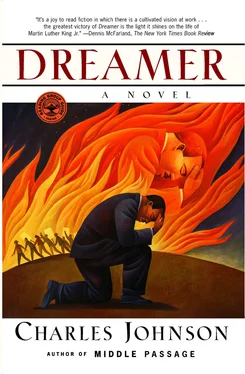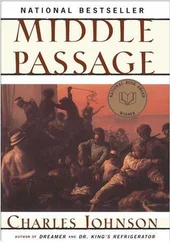“It is with great pleasure,” said Rev. Coleman, “that I present this Achievement Award to you from the grateful membership of Calvary AME Church.” He handed a heavy plaque, gold lettering engraved on black, to the minister and shook his hand vigorously; then, smiling, Coleman turned the ceremony over to King.
I should have been watching the crowd, but I could not wrench my eyes away as King, the portrait of composure that evening, despite all he’d endured only hours earlier, placed the plaque to one side on a small table of flowers, his movements as flawless as those of a fish, his fingers seeming to merge with the surface of the pulpit. More than any place else, he was at home there, in the pulpit, leaning into the microphones, having preached since his teens beside his father, and then during his college years in the Baptist churches of King Senior’s friends in Boston and throughout the South, incorporating the best of what he learned from Mays and Brightman in their classrooms into sermons he thrilled audiences with — in his early twenties — the very next Sunday. How had he put it in one sermon? “As a young man with most of my life ahead of me, I decided to give my life to something eternal and absolute. Not to these little gods that are here today and gone tomorrow. But to God who is the same yesterday, today, and forever.” He never knew — could never know — exactly what the room he was to speak in would look like. For the briefest of instants, the length of an Amen, he adjusted his voice to the room’s unique acoustics and the placement of the stage. He got through these engagements, for which he was paid between $500 and $1,000, by focusing exclusively on the present moment, living completely in the here, the now, oblivious to whatever programs he had scheduled for the next day, willfully forgetful of how well or poorly he’d done before. His experience of time was reduced, on the road, to seriality, fully lived moments — like islands — separate from one another: he was here (Chicago) and here (Jamaica) and here (Paris) with little bridge between locations. Some days it felt as if his life dissolved or abruptly cut from place to place, as in a film.
Fortunately, he didn’t truly need notes anymore. He’d done this so often before that he could speak for two hours or three without once looking down. The quotations he needed were permanently imprinted in his memory. All he need do was “switch,” as he put it to himself, into a public mode, and the words, one whole structured paragraph after another, came pouring out of him. In his teens, when speaking became effortless this way, he’d wonder after an event, “Did I really do that?” because his public self had seemed so different to him, like a mask; but then he realized some few years later that man and mask were fused. His private self was the mask. The Movement left no room for subjectivity; inner and outer were the same.
“Thank you … thank you very much,” he said as he glanced around the church, making visual contact with everyone, including those crammed into the balconies. “A moment ago, Reverend Coleman asked me if I was disillusioned after today’s march. He asked me if I felt we were wrong to come to Chicago, and what did I make of the hatred we saw in Marquette Park. Now, I can’t lie to you. I was stunned. In every one of those screaming white faces I saw hatred that obliterated the last vestiges of humanity. I saw sickness and evil brought on by segregation and sinruined lives. Because, you see, those people were living in fear. They were afraid that accepting Negroes as their neighbors — or anybody different — meant they’d lose their homes, their jobs, their place in society, possibly even their sons and daughters in marriage to people who don’t look the way they do. They feared losing their sense of self, and we all know that’s the most powerful fear on earth, the one that fuels all the others. Fear, I’ve been told, is a drug — it releases peptide hormones that have the same pharmacologie characteristics as opium. You could say that anyone experiencing fear is narcoticized, not in his right mind, mesmerized, in the constant state of hypnosis so many metaphysicians tell us is the human condition. That’s what I saw today. People throwing bricks at phantoms. Shouting at shadows, since there are no Negroes, and whites either, except of course in their own deluded minds …
“After liberating lunch counters, winning court battles and homes in nice neighborhoods, we must in our next campaign free consciousness itself from fear, from what William Blake called ‘mind-forg’d manacles.’ But to do this we must unlearn many things. We must be quiet and not deluded or deceived by the creations of our own minds. The soil of the soul must be plowed. Reverend Coleman”—he squinted behind him at the pastor sitting rapt beside Amy—“the answer to your question is that no man can bring me so low as to make me hate him, no matter what we ran up against today in Chicago, because hate is based on fear, and I don’t fear losing anything since I willingly gave up everything to the one I love.”
The audience sang back, “Preach!”
“That’s right,” he went on, raising his right hand to tug at his earlobe, light spinning off his simple wedding band, “I’ve got nothing to lose. Nothing to fear because after being in the storm so long I’ve learned to accept only one problem: What is God? Every night when I get down on my knees to pray or close my eyes in quiet meditation I’m holding a funeral for the self. I’m digging a little grave for the ego. I’m saying, like the lovely Catholic nun I read about who works with the poor in Calcutta, that I will despoil myself of all that is not God; I will strip my heart of every created thing; I will live in poverty and detachment; I will renounce my will, my inclinations, my whims and fancies, and make myself a willing servant of the will of God. As Whitehead might put it, ‘I am’ is an example of Misplaced Concreteness. And what’s left when you get the I out of the way? Only the others, living and dead, who are already so thoroughly integrated into our lives you can never get rid of them. No, the segregationists lost before they even began. Nothing stands alone. You know, not one member of the White Citizens’ Council can finish breakfast in the morning without relying on the rest of the world. That sponge ‘Bull’ Connor bathes with came from the Pacific Islands. His towel was spun in Turkey. The coffee Orval Faubus drinks traveled all the way from South America, the tea from China, the cocoa from West Africa. And every time George Wallace or Malcolm X writes his name he’s using ink evolved from India and an alphabet inherited from the Romans, who derived it from the Greeks after they’d borrowed it from Phoenicians, who received their symbols from Seirites living on the Sinai peninsula between Egypt and Palestine … After a time, I tell you, a man comes to see only a We, this precious moment as a tissue in time holding past, future, and present, with all of us in the red, everlasting debtors — ontological thieves — in a universe of interrelatedness … Every man and woman is a speculum, our mirror. Our twin.”
Shivers played across my shoulders. The more I listened and looked, the more I suspected that it was Smith, not King, at the microphone, speaking to all gathered, yes, but in a way not to us at all — or, more exactly, to the spirit immanent in each parishioner, offering his speech as a form of sacrifice, holding nothing back, forgetting himself utterly in the demands of the moment and allowing the Father within him to doeth the work and the Father within us to receive it,
“Think about it.” He stroked his chin now, continuing without notecards or a single piece of paper in front of him. “We do everything we can to avoid facing ourselves and, by virtue of that, the real structure of reality, which Sir James Jeans, the physicist, tells us is more like a great thought than a machine driven by matter. Sir Arthur Eddington put it just as succinctly, saying — if I remember this right—‘The external world of physics has become a world of shadows. In removing our illusions we remove substance, for indeed we have seen that substance is one of the greatest of our illusions.’ Yet and still, most of us have carnal minds. Crude minds. We forget that nothing burns in hell except self-will. We seldom, if ever, think four-dimensionally. Lord, we hate to think at all, judging by how we spend our time. By the time most of you are sixty-five years old, you will have looked at 102,000 hours of television, heard 25,000 hours of radio, seen 300,000 comic pages and 3,599 movies, drunk 18,000 bottles of beer and 3,000 fifths of whiskey … and never devoted one hour to meditating on the truth that whatever is done to the least of us is done to all, and to the Lord we say we love. If you believe in Jesus, then you believe in the man who sleeps outside your door on the street. The single woman struggling to feed her children. The worker deprived of his job. You believe in the brokenhearted, the poor, the unemployed, the captive, the blind, the bruised. And all the countless outcasts tossed to one side by a society that values profits more than it does people. But I know that at the numinous heart of being, there is a Heart, a Father who, if we approach the poor by one span, will come to us by one cubit; if we move toward the needy one cubit, He draws nearer by a fathom; if we love all men as our brothers, He embraces us with a redemption greater than any fortune in the world. Brothers and sisters, Reverend Coleman, no man can make me hate. I have no choice but to love others because I am the others. Reason (to say nothing of self-interest) demands that I care for them as much as I do for myself.
Читать дальше












